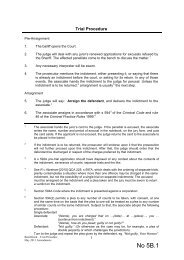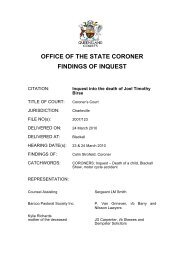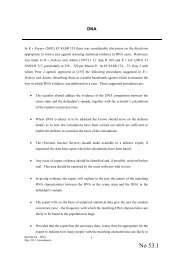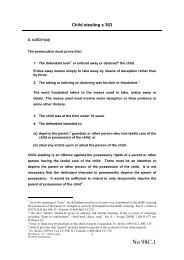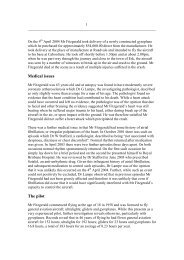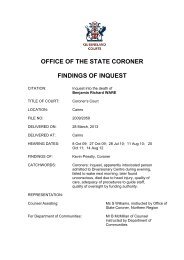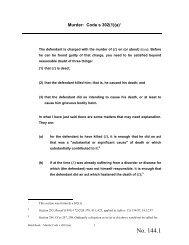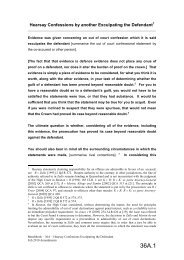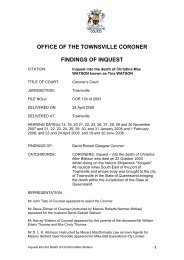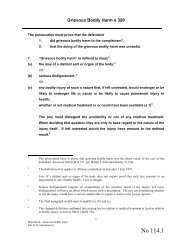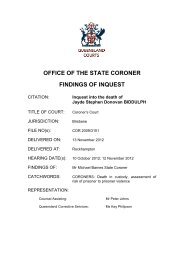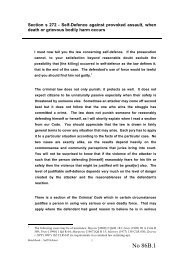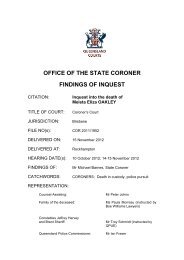Inquest findings - Rosly Amelia Law - Queensland Courts
Inquest findings - Rosly Amelia Law - Queensland Courts
Inquest findings - Rosly Amelia Law - Queensland Courts
Create successful ePaper yourself
Turn your PDF publications into a flip-book with our unique Google optimized e-Paper software.
Given this issue has not been considered by the QLRC since 1977, and<br />
given there are a number of complex issues that need consideration, it<br />
may be the QLRC is best placed to advise Government on the matter.<br />
134. It is recommended the <strong>Queensland</strong> <strong>Law</strong> Reform Commission<br />
review its recommendations of the 1977 working paper concerning<br />
the abolition or retention of the rule in Searle v Wallbank with<br />
respect to the civil liability of owners or occupiers for damage<br />
caused by animals straying upon highways and what should be put<br />
in its place, and otherwise make such recommendations for change<br />
as it considers appropriate.<br />
Blood Alcohol and Drug Testing<br />
135. Currently the authority for police officers to require specimens of breath<br />
for breath test or specimens of blood for blood tests is based on the<br />
<strong>Queensland</strong> Police Service Traffic Manual and the Transport Operations<br />
(Road Use Management) Act.<br />
136. Section 80(2A) of TORUM provides that an officer may require a<br />
person to provide a specimen of breath where a motor vehicle was<br />
involved in an incident resulting in injury to or the death of any other<br />
person if the police officer suspects, on reasonable grounds, such<br />
person was driving the vehicle at the time of the incident.<br />
137. The current policy is that any decision made to test for other<br />
substances other than alcohol is subject to the officer observing indicia<br />
which suggests the person is otherwise under the influence of a drug.<br />
The manual sets out a number of criteria to assist a police officer to<br />
make such assessment.<br />
138. It is accepted that in rural areas there may be practical difficulties in<br />
arranging blood tests but that has long been the case yet there are many<br />
instances, such as this case, where blood has been taken and<br />
subsequently analysed for alcohol. There would seem to be no reason<br />
why it should not also be used for drug testing. The circumstances of<br />
this case highlight the difficulties for police officers to make such fine<br />
assessments of impairment based on indicia. The driver in this case<br />
presumably displayed no such indicia, yet the medical evidence of the<br />
results of the blood analysis clearly supports the driver was highly<br />
probably impaired.<br />
139. Whatever may be the practical difficulties, and accepting there may be<br />
resource implications, they should be overcome given we are talking<br />
about only the most serious cases involving death or serious injury.<br />
140. It is recommended that the <strong>Queensland</strong> Police Service ensure<br />
there is performed full alcohol and drug testing of all potentially<br />
culpable surviving drivers involved in motor vehicle accidents<br />
where serious injuries or deaths occur. This may require<br />
amendments to both policy and legislation.<br />
Findings of the inquest into the death of <strong>Rosly</strong>n <strong>Amelia</strong> <strong>Law</strong> 21




